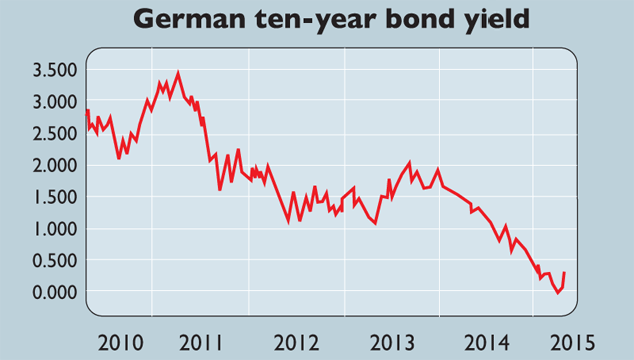
Not much makes sense in the fixed-income markets these days, says MoneyWeek’s Tim Price on his blog, thepriceofeverything.typepad.com. After a 30-year bull market, bonds are so expensive that only “billionaire altruist lunatics with a death wish” should buy them. But recent developments in the German government bond, or bund, market have been quite extraordinary.
The average yield on German government debt is now less than zero, meaning that lenders are paying to give the government money. Yields on bunds with a maturity of up to eight years have entered negative territory, while the ten-year yield also practically disappeared last month.
This is partly because the European Central Bank (ECB) is buying them up through its quantitative-easing (QE) programme. And German paper is rated the safest in the eurozone, so it is seen as a safe haven in jittery times. But prices have drifted far beyond levels that increasingly shaky fundamentals can justify.
David Roberts of Kames Capital has warned of a “potentially poisonous cocktail of resurgent inflation and wage increases”. Germany’s economy looks strong, with inflation quickening to 0.3% in April from 0.1% the month before. That has raised the prospect of wages increasing, in turn spurring more demand.
Hence inflation expectations are on the rise. It’s also worth noting that, in the eurozone as a whole, deflation has disappeared: prices are flat year-on-year. And according to the ECB, a key gauge of the eurozone money supply is rising at its fastest pace since 2009. Inflation is especially damaging for bonds as it erodes the value of a fixed sum of money.
So it’s no wonder that bond gurus Bill Gross and Jeffrey Gundlach have respectively called bunds the short “of a lifetime” and “of the century”. Not long afterwards, they appeared vindicated; German bunds suffered their worst sell-off since 2011 last week. The ten-year yield has jumped 11-fold from its low, “making for an especially cruel April for leveraged long players”, notes Randall Forsyth in Barron’s.
Maybe Gundlach and Gross established their positions before they made their pronouncements, as CRT Capital’s David Ader mused to Barron’s, or maybe it was just a coincidental correction in an overheated market. But this episode is a reminder of the huge potential downside in government bonds when the bubble bursts.